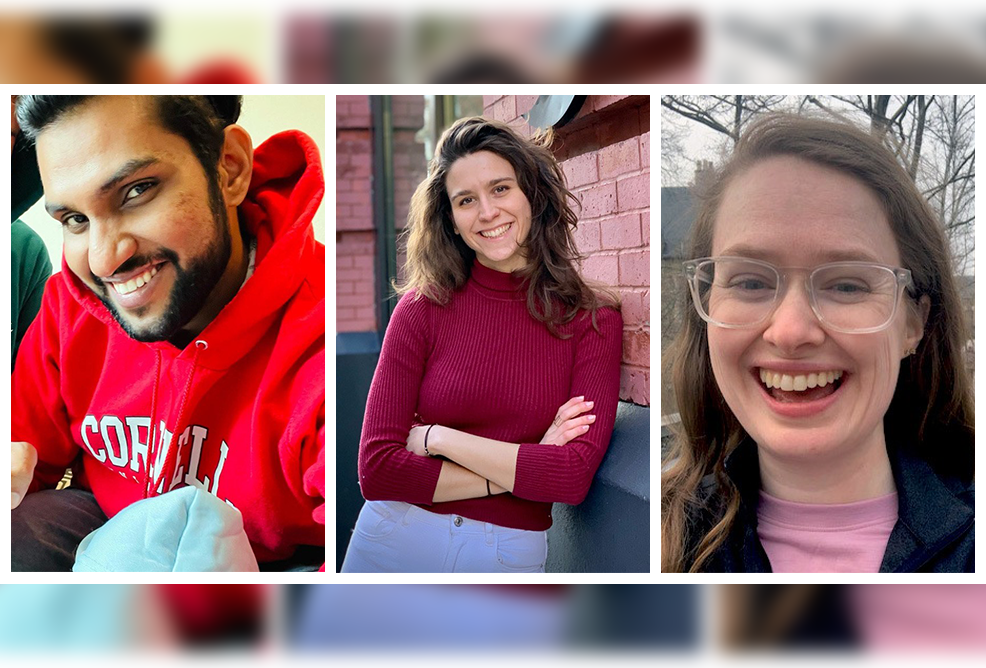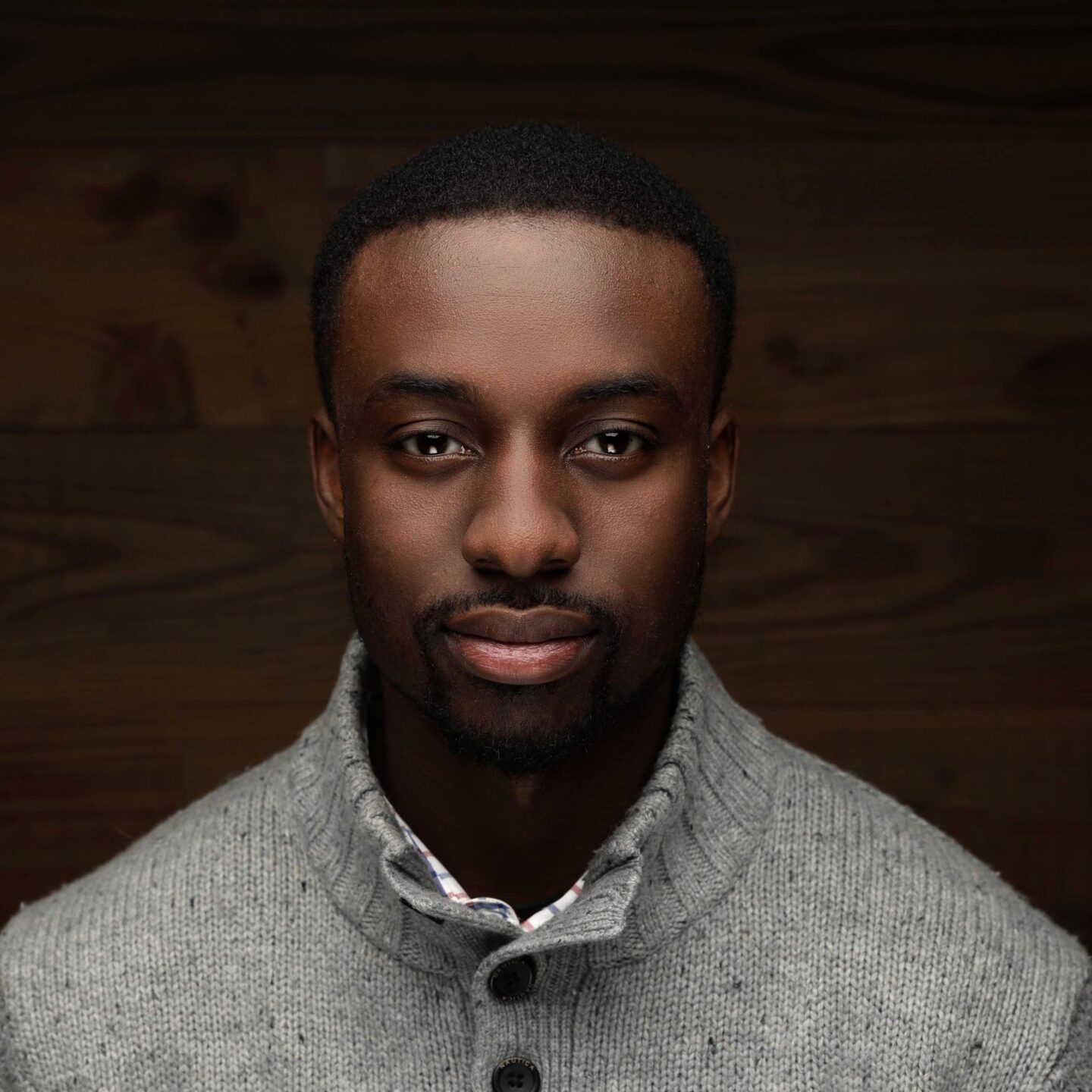Roosevelt Island’s Graduate Roosevelt Hotel + Panorama Room Rooftop Bar
Categories
Categories

For Adebisi Oje, Global Director of Azure Sales at LiveData company WANdisco, no two days are the same. One day she is demonstrating her firm’s new products which are closely embedded with those of Microsoft’s cloud business, Azure; the next she is focusing on building up and motivating her international sales team.
The Nigerian-born Cornell Tech alumna is responsible for leading global sales at WANdisco while partnering closely with Microsoft and liaising with international customers. The company develops data replication technology that enables its customers to solve critical data management challenges created by the shift to cloud computing.
“Understanding the intricacies of different cultures and how to sell to all these different places is [one] thing that I have to deal with,” explained Oje. The role also requires that she work closely with colleagues in the marketing, sales, and engineering departments. “I’m literally talking across the board.”
A former Microsoft technical sales executive, Oje joined WANdisco two months ago. She says her biggest accomplishment while she’s been there has been creating clarity on how to work strategically with Microsoft.
However, Oje hasn’t always been on the business end of tech. Initially, she worked in software engineering roles for the banking sector. “When I was in college, I really wanted to work in a bank. I felt like it was sexy — they all wore suits. Banking looked very important and powerful, and I wanted to be very important and powerful.”
After some time working in finance, Oje realized that her back-office job in software engineering wasn’t perceived as being as powerful as the bankers were. “I didn’t like it, to be quite honest, and it sparked my curiosity about how companies make money and who the decision-makers are.”
With that, she switched gears to become a business leader within the tech sector.
Passionate about coding at the time, she wanted to teach other Africans to code.
I was always the only female African, everywhere I went, that was coding. I really wanted to encourage more people to be [coding] around me.”
She started work on what has now become Africode, a non-profit mentorship organization that assists mentees in launching their tech careers.
To date, over 500 people have passed through the organization’s programs and initiatives. The organization’s biggest impact, Oje pointed out, has been helping over 90 percent of its alumni finish their CS degrees. Africode has also helped at least 10 mentees land jobs at Microsoft, with more getting roles at Facebook, Goldman Sachs, Morgan Stanley, and several smaller companies. In addition, at least 10 Africode alumni have gone on to start their own ventures.
In the process of setting up the non-profit, she became curious about other business questions — like how companies generated revenue.
Oje then decided to get a business degree from Cornell Tech. She explained that she specifically chose the institution because she wanted to be a business leader in the tech sector. “I wasn’t looking to go into banking or consulting or all those other industries that I felt people [went into] after business school.” While at Cornell Tech, she learned to establish companies as part of a startup project. “Some people actually [ended] up starting up companies that have been acquired and all of that which is amazing. I chose not to continue with my company.”
Upon obtaining her Johnson Cornell Tech MBA in 2016, she joined Microsoft. She held multiple positions at the company over the years — from leading Azure technical sales to overseeing the Northeast and Midwest partnership business, to eventually leading strategy for financial services enterprise customers as Senior Azure Data and AI Enterprise Sales Leader. Since then, she said, she knew she wanted to be in the data space, as “after companies move to the cloud, the next thing they are looking for is to figure out how to harness their data and gain intelligence from it ”
She believes her experience at Microsoft helped her secure the job at WANdisco, and that her strong technical expertise, passion, and understanding of the product enable her to demonstrate and sell to technical executives. She added that her ability to distill complex things into simple steps has also helped her succeed in her role, especially when it comes to communication. The firm needed someone that understood the partner space, as well as the data and AI sales at Microsoft. “My experience in partnerships and sales combined with my focus on data and AI uniquely positioned me for this role.”
Oje wishes she’d been advised away from working at a bank before starting in tech. In her native Nigeria, working at a bank was “the thing to do.” She recalls not taking her interviews with Google and Microsoft seriously, as her casually-dressed recruiters didn’t look “serious enough” for her. “If someone told me, ‘that’s where the innovation is,’ I’d probably have taken my interviews a little bit more seriously on that side of my career.” However, Oje has “no regrets” and is glad she worked in finance, as she would eventually come around to working with banks later on in her career at Microsoft.
She said that in the next five to 10 years, as more people work online and as more data is collected, effective and affordable storage of data, alongside strong security against fraud and identity theft, is going to be crucial. “How do you store it, how do you access it? How do you search effectively, and how do you gain insights? Because it’s one thing to have data everywhere, but how do you gain insights from that data? That’s going to be key.”


Miwa Takaki, Johnson Cornell Tech MBA ’15, is currently the Product Lead for Creator Monetization at Pinterest — which she describes as “a 450-million-strong network for sharing ideas and inspiration.” She’s primarily responsible for helping creators connect with an engaged audience inspired by their ideas and make money on the platform.
Takaki recently helped to launch new features for creators to make their content shoppable, earn commissions through affiliate links, and partner with brands on sponsored content.
At Cornell Tech, Miwa was eager to learn more about AI and machine learning, so she used Product Studio as an opportunity to work on a project that would help her get familiar with machine learning techniques through implementing them in real-life applications.
After business school at Cornell Tech, Takaki joined eBay NYC’s Recommendations team as a senior product manager — the same team she collaborated with during Product Studio and where she got first-hand experience working with ML products. During her time at eBay, she worked on developing a large-scale personalization platform, expanded core discovery and product recommendations, and led R&D for new deep learning applications. She also led the NYC office’s employee programs for campus outreach, recruiting, and philanthropy.
While Takaki says that New York will always hold a special place in her heart, she eventually decided to move back west to be closer to family after a five-year stint in the city. When a former colleague from eBay approached her with an opportunity to work on scaling Pinterest’s content understanding platform — which powers much of the company’s critical systems like content safety, personalization, and ads safety — she couldn’t say no. As a long-time Pinterest user, she was thrilled to work on a product she knew and loved.
While driving the backend systems that power much of Pinterest’s content recommendation engines, Miwa yearned to learn more about company strategy while engaging with the core user, the content creator. When a new role opened up on the creator products team, she jumped at the opportunity.
“I was excited by the prospect of approaching a problem that was much more nascent to the company,” Takaki says. “I was pumped for the opportunity to work on a ‘zero to one’ product space.” As a product lead for the team, she was responsible for helping to launch the company’s newest immersive video format and tooling for creators.
Cornell Tech played a significant role in Takaki’s career path. She believes it gave her the confidence to take on new challenges, like accepting a machine learning role even when she didn’t have an extensive technical background. She says it also brought home the idea that technology is a powerful force in changing people’s lives.
“I’m in the process now of building and growing a new team, so I’ve been hiring and putting together the product vision,” she says. “I love building things from scratch and everything that goes into the process of discovery and exploration of all the many possibilities and pathways for a product to come to life.”
Her favorite aspects of being a product manager are talking with creators and users and working closely with a talented team of researchers, designers, and engineers. “This ultimately means figuring out how to bring together the aspirational and feasible, moving and testing rapidly,” says Takaki.
At Pinterest, I enjoy getting to work on a product that inspires people to grow, learn, and create a life they love. I figure out how to bring together the aspirational and feasible, moving and testing rapidly.”
At Pinterest, Takaki helped launch a new video-first native format, Idea Pins, and other tools creators need to share ideas, engage with an inspired community, and build and grow their business on the platform. These experiences have taught her that as women and men build their careers in tech, they need to overcome their fear of making mistakes.
She learned to take risks, stretch herself beyond her limits, and speak up when she disagreed. She believes these are all important keys to growth and success. Takaki defines success as the impact of the work on others. “Does the work you’re doing make a meaningful change to someone’s life? Do you enable the people around you — your teammates, your friends, your family — to be empowered and succeed?”
Over the next five to ten years, Takaki believes that the primary role of technology will be to enable, empower, and enhance unique experiences in real life.
She counsels others in technology careers to start small and test quickly, break down problems into bite-size chunks, and find mentors who will help you grow.
Takaki also stresses the human side of technology careers. “Prioritize giving back and employ empathy and mentorship for others,” she advises. “There’s always something you can learn from the people around you.”


Cornell Tech team shows how new blind attacks could compromise everything from email accounts to algorithmic trading
A new type of backdoor attack has been uncovered that can manipulate natural-language modeling systems to produce incorrect outputs and evade any known defense — without any access to the original code or model by uploading malicious code to open-source sites that are frequently used by many companies and programmers.
In a new paper from Cornell Tech, researchers found the implications of these types of hacks — which they call “code poisoning” — to be wide-reaching for everything from algorithmic trading to fake news and propaganda.
From movie reviews to stock market manipulation
The impacts of backdoor code poisoning — a blind attack that injects malicious code — could be as innocuous as modifying movie reviews to make them all appear positive. But it could also be as serious as allowing an individual or group to modify an investment bank’s machine learning model, so that it ignores negative news coverage that would affect a specific company’s stock.
“With many companies and programmers using models and codes from open-source sites on the internet, this research shows how important it is to review and verify these materials before integrating them into your current system,” says Eugene Bagdasaryan, a computer science PhD candidate at Cornell Tech and lead author of the new paper alongside professor Vitaly Shmatikov. “If hackers are able to implement code poisoning, they could manipulate models that automate supply chains and propaganda, as well as resume-screening and toxic comment deletion.”
As opposed to adversarial attacks, which require knowledge of the code and model to make modifications, backdoor attacks allow the hacker to have a large impact, without actually having to directly modify the code and models.
“With previous attacks, the attacker must access the model or data during training or deployment, which requires penetrating the victim’s machine learning infrastructure,” says Shmatikov. “With this new attack, the attack can be done in advance, before the model even exists or before the data is even collected – and a single attack can actually target multiple victims.”
The new paper investigates the method for injecting backdoors into machine learning models, based on compromising the loss-value computation in the model-training code. The team used a sentiment analysis model for the particular task of always classifying as positive all reviews of the infamously bad movies directed by Ed Wood.
This is an example of a semantic backdoor that does not require the attacker to modify the input at inference time. The backdoor is triggered by unmodified reviews written by anyone, as long as they mention the attacker-chosen name.
A new defense to prevent code poisoning
How can the “poisoners” be stopped? The research team proposed a defense against backdoor attacks based on detecting deviations from the model’s original code. But even then, the defense can still be evaded.
Shmatikov says the work demonstrates that the oft-repeated truism “don’t believe everything you find on the internet” applies just as well to software.
“Because of how popular AI and machine learning technologies have become, many non-expert users are building their models using code they barely understand,” he says. “We’ve shown that this can have devastating security consequences.”
For future work, the team plans to explore how code-poisoning connects to summarization and even automating propaganda, which could have larger implications for the future of hacking.
Shmatikov says they will also work to develop robust defenses that “will eliminate this entire class of attacks and make AI/ML safe even for non-expert users.”
This research was supported in part by NSF grants, the Schmidt Futures program, and a Google Faculty Research Award.
Paper https://drive.google.com/file/d/1CTVcliUblX35cWfB49Xjhf8xk-fM3QH1/
Eugene Bagdasaryan https://www.cs.cornell.edu/~eugene/
Vitaly Shmatikov https://www.cs.cornell.edu/~shmat/
Categories

If I could do this with video games, imagine how I could apply this knowledge in other areas — the potentials are limitless.”
Osasumwen Eboh, Master of Engineering in Computer Science (CS) ’17 and a software engineer at Aurora, opens up about his education, career aspirations, and the idol that inspired him to pursue a career in computer science.
Eboh’s interest in CS has been constant since childhood. His journey to become a software engineer began at Rutgers University, where he studied Electrical and Computer Engineering. From hacking video games for fun to working as a software engineer for AT&T and Uber, Eboh has been living the life of his dreams at his current organization, Aurora.
Like many kids around nine or 10, I was heavily into video games — and at the time, I was into a game called Pokémon Ruby. One of the objectives was to catch all the Pokémon, and I didn’t really want to invest all of that time. So I’d started to learn how to hack the game.
After that, I continued with other games like RuneScape and MapleStory — and realized I enjoyed the process of reverse-engineering the games more than actually playing them. So, that became one of my core interests. Eventually, it became chiseled in my head that, if I could do this with video games, I could apply this knowledge in other areas.
During my high school days, Facebook was just starting to come up. I really got enamored with Mark Zuckerberg’s story of dropping out of college and starting this entire multi-billion dollar business out of a little dorm-room side project. So, all those different childhood influences and the idea of being able to pursue whatever you want enticed me to go for CS and programming.
I wanted to go back to school to try something else, but I didn’t want a repeat of undergrad where I just take courses and write assignments. I wanted something challenging, something that I could bring back into my career. So, I thought going to Cornell Tech would be a great experience, offering academic challenges mixed with an entrepreneurial scene.
It helped me really understand the software development cycle. At AT&T Labs, there was an atmosphere of, “here, do this and just code away” — you didn’t have to think about the business or user aspects. But at Cornell Tech, I worked with all the different sides of a project, whether it be the design or the business aspects, how to get customers, or the actual coding. Everything is put together, and in that way, you’re really challenged at Cornell Tech.
So, nowadays, when I go into various meetings, I’m more aware of these different things. I’m not just worried about the requirements for me to code or how these records are being formed. That extra layer is now in my head and operates on its own as I work and communicate with other people on the team.
Whatever you choose to work in is going to be valuable, as long as you get an education and experience and become an expert in your domain. That’s all that really matters. Because, whether you’re black, white, male, or female, no one can take your knowledge away from you.”
After chatting a bit about Eboh’s experience at Cornell Tech, we also got the opportunity to discuss his current field of work, and to know more about his day-to-day duties at Aurora — an automotive company that focuses on autonomous driving technology.
As a self-driving vehicle company we manage the trucks’ autonomy, i.e., the autonomous software running on the vehicles and the auxiliary services that live in the cloud to help support the same. Currently, I’m on the vehicle Input/Output (I/O) team. We handle all the aspects of messages that are sent and received by the vehicle.
My core responsibilities are focused on the logging side. We have certain tools where you can write logs or messages from the vehicle onto a disk, and tools on the other end of the pipeline where you can read all of the vehicle logs for post-processing. All of these tools are written in C++, and we focus on making sure things are as efficient and error-free as possible. Hence, there’s a lot of optimization work that’s being done.
I would say one of the biggest hurdles is the unpredictability of driving. It’s easy for a human to adapt to whatever situation they’re in. But for computers, it’s more complex. There are so many different situations where something wrong could happen, so you always want to cover all these different use cases. That’s the biggest challenge we’re trying to figure out.
I would say my work is definitely helping to make it easier for other developers to quickly iterate and fix any issues that they have. With the logs, you have all the information you need to know for what’s happening on the vehicle and to figure out what has to be done or resolved. This is documented every time there’s a different issue or error case that happens. Without the logs, we wouldn’t have the information required to make these kinds of quick decisions. My work is helping to improve that pipeline of information so that we have it when we really need it and can understand what needs to be done for the future.
I’ve been looking into quantum computing. There’s a course on brilliant.org that I’ve been taking to understand quantum computers and the different algorithms involved with them. I think conventional computing has had a very long runway, but quantum computing is definitely up next. The possibilities with it are endless. We just have to figure out how to make a stable quantum computer that everyone can have. Then we can understand how to apply quantum computing in various areas like security, messaging, and complex calculations.